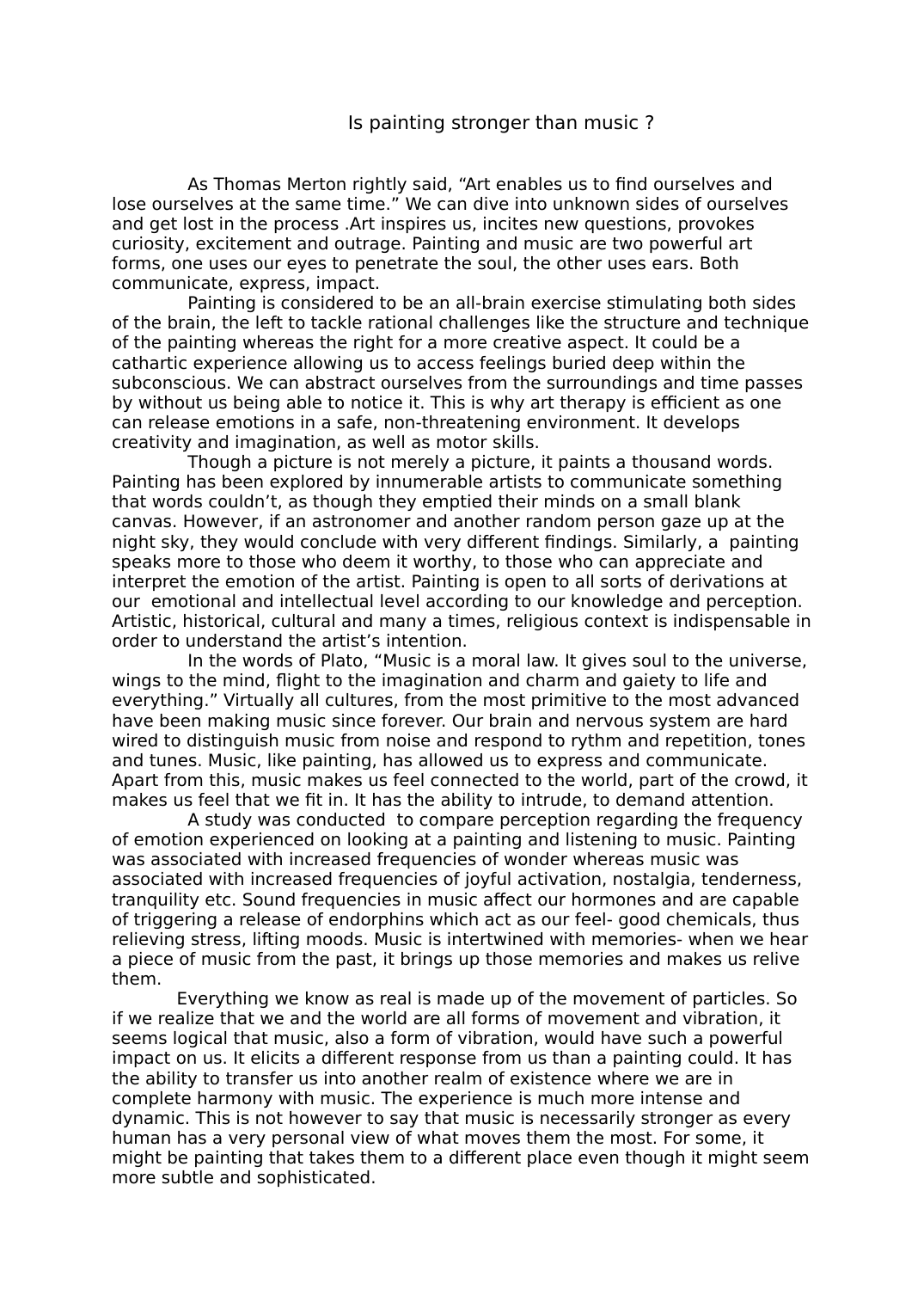Is painting stronger than music ?
Publié le 25/02/2021

Extrait du document
«
Is painting stronger than music ?
As Thomas Merton rightly said, “Art enables us to find ourselves and
lose ourselves at the same time.” We can dive into unknown sides of ourselves
and get lost in the process .Art inspires us, incites new questions, provokes
curiosity, excitement and outrage.
Painting and music are two powerful art
forms, one uses our eyes to penetrate the soul, the other uses ears.
Both
communicate, express, impact.
Painting is considered to be an all-brain exercise stimulating both sides
of the brain, the left to tackle rational challenges like the structure and technique
of the painting whereas the right for a more creative aspect.
It could be a
cathartic experience allowing us to access feelings buried deep within the
subconscious.
We can abstract ourselves from the surroundings and time passes
by without us being able to notice it.
This is why art therapy is efficient as one
can release emotions in a safe, non-threatening environment.
It develops
creativity and imagination, as well as motor skills.
Though a picture is not merely a picture, it paints a thousand words.
Painting has been explored by innumerable artists to communicate something
that words couldn’t, as though they emptied their minds on a small blank
canvas.
However, if an astronomer and another random person gaze up at the
night sky, they would conclude with very different findings.
Similarly, a painting
speaks more to those who deem it worthy, to those who can appreciate and
interpret the emotion of the artist.
Painting is open to all sorts of derivations at
our emotional and intellectual level according to our knowledge and perception.
Artistic, historical, cultural and many a times, religious context is indispensable in
order to understand the artist’s intention.
In the words of Plato, “Music is a moral law.
It gives soul to the universe,
wings to the mind, flight to the imagination and charm and gaiety to life and
everything.” Virtually all cultures, from the most primitive to the most advanced
have been making music since forever.
Our brain and nervous system are hard
wired to distinguish music from noise and respond to rythm and repetition, tones
and tunes.
Music, like painting, has allowed us to express and communicate.
Apart from this, music makes us feel connected to the world, part of the crowd, it
makes us feel that we fit in.
It has the ability to intrude, to demand attention.
A study was conducted to compare perception regarding the frequency
of emotion experienced on looking at a painting and listening to music.
Painting
was associated with increased frequencies of wonder whereas music was
associated with increased frequencies of joyful activation, nostalgia, tenderness,
tranquility etc.
Sound frequencies in music affect our hormones and are capable
of triggering a release of endorphins which act as our feel- good chemicals, thus
relieving stress, lifting moods.
Music is intertwined with memories- when we hear
a piece of music from the past, it brings up those memories and makes us relive
them.
Everything we know as real is made up of the movement of particles.
So
if we realize that we and the world are all forms of movement and vibration, it
seems logical that music, also a form of vibration, would have such a powerful
impact on us.
It elicits a different response from us than a painting could.
It has
the ability to transfer us into another realm of existence where we are in
complete harmony with music.
The experience is much more intense and
dynamic.
This is not however to say that music is necessarily stronger as every
human has a very personal view of what moves them the most.
For some, it
might be painting that takes them to a different place even though it might seem
more subtle and sophisticated..
»
↓↓↓ APERÇU DU DOCUMENT ↓↓↓
Liens utiles
- Error: There's a form with more q than Q, trying to fix Définition: ADDITIVITÉ, substantif féminin.
- Error: There's a form with more q than Q, trying to fix ADDITIVEMENT, adverbe.
- Error: There's a form with more q than Q, trying to fix ACERBITÉ, substantif féminin.
- Error: There's a form with more q than Q, trying to fix ACCRÉTION, substantif féminin.
- Error: There's a form with more q than Q, trying to fix ACCRÊTÉ, -ÉE, ACRÉTÉ, -ÉE, adjectif.


